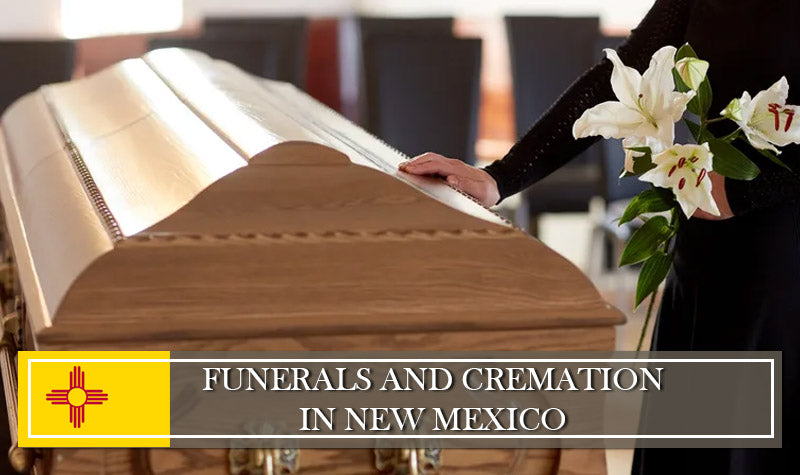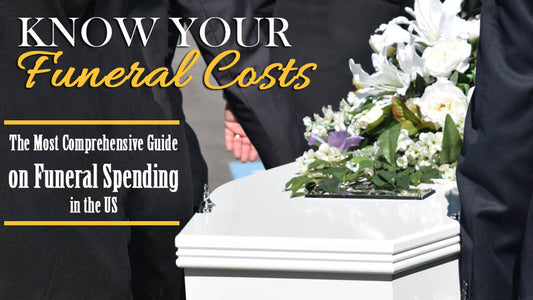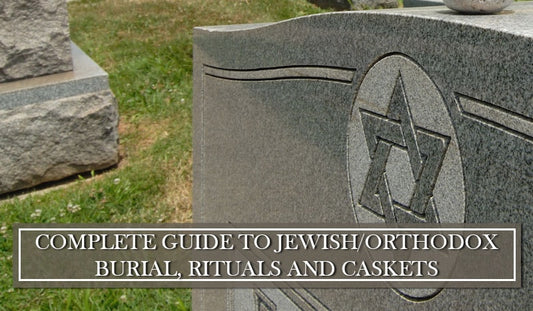
Rules and Regulations on Funerals, Burials and Cremation in New Mexico
Sadly, it's only a matter of time until we have to deal with the death of someone in our life. When the time comes, there are going to be a lot of things to address. Not only that, but you will have to control your grief, and you'll also have to take care of the funeral and other arrangements.
Our guide will provide you the most significant aspects that anyone has to manage at a funeral. Some laws and regulations are universal for all states, whereas others differ from one state to the next. Here's what you need to know when you have to prepare a funeral in New Mexico.
What process to follow for obtaining the death certificate in New Mexico?
You cannot wait for more than five days after death to file for the death certificate with the local registrar. You also have to do it before the final disposition of the body takes place.

The filing of the death certificate is one of the many things the funeral home, cremation organization, mortuary, or the person managing the deceased’s remains has to take care of.
At this time, an electronic death registration system is functioning in New Mexico, but paper death certificates are still utilized. The vital records department of the New Mexico Department of Health will provide you with a blank death certificate and guide you through the process as well.
Which persons/organizations can ask for the death certificate in New Mexico?
In the state of New Mexico, only the immediate family members or the persons proving the legal interest in the record can ask for the death certificate. The deceased’s parent, sibling, adult child, grandparent, adult grandchild, and current spouse are defined as immediate family.
The rule applies only if the death didn’t occur more than 50 years ago.
What’s the common procedure to follow for obtaining a copy of the death certificate?
One effortless method to get a copy of the death certificate is to demand the organization/person filing the document to acquire it for you at the time of death. To get you an idea about how many copies you will need, we note that an executor of the estate will use more than ten certified copies.
Every time you’re going to solicit benefits or properties in the name of the deceased, you will have to present a copy of the death certificate. Social security benefits, life insurance proceeds, veterans benefits, and payable on death accounts are only some of the many situations where a copy is required.
What can you do if you need a copy after the time of death?
Check the website of the New Mexico Department of Health to find out the steps to take for obtaining another copy after the time of death. Downloading a mail-in order or online ordering a copy of the death certificate is the standard procedure.
Make sure you have an I.D. photo issued by the government within reach. You need to present a copy of it when asking for a copy of the death certificate.
How much does a copy of the death cost you?
You will pay $5 for a certified copy of the death certificate in New Mexico.
Who’s lawfully obliged to file in the death certificate in New Mexico?
When you don’t have a funeral director and take care of everything on your own, completing and filing the death certificate is your responsibility.
Who is legally responsible for completing the medical section?
The deceased’s nurse practitioner, doctor, or any medical professional have to also take a look at the death certificate. Completing the medical section of the death certificate is one of their responsibilities. Any of them is legal to specify the date, time, and cause of death.
Once they’re completed and filled in the medical section, they have 48 hours for returning the death certificate.
As long as the attending physicians agree, the doctor performing the autopsy can also complete the death certificate. However, he/she will need access to the deceased’s medical history and seek if the cause of death was natural. When the cause of death isn’t natural, or the patient hasn't been medically treated for more than ten days, the case goes to the state medical investigator. The completion of death certificate will follow.
Does the New Mexico law require you to hire a funeral director?
Having the deceased at home after he/she dies is lawful in every state, and New Mexico is not the exception. Suffice to say, no New Mexico law forces you to hire a certified funeral director when taking care of the final arrangements.
How should you opt for a funeral home in New Mexico?
Even if it's going to be more expensive, hiring a funeral home is going to make the whole funeral experience more comfortable to handle. The New Mexico State Regulation & Licensing Department Board of Funeral Services administers the licenses for funeral homes in New Mexico.
In the state of New Mexico, you can choose from over 80 funeral homes and mortuaries. The type of funeral you wish to have and the location are the main factors when selecting the funeral home.
Would you be interested in a traditional burial, or do you want a cremation? Are you trying to stick to a budget, or you’re willing to spend the extra buck for an impressive casket? The more precise your wishes are, the easier it will be to find the funeral home fitting your needs and wishes.
Asking your friends and families can also work, but it’s not going to be much of help if you’re very specific about certain rituals.
Who’s lawfully entitled to take care of the funeral arrangements in New Mexico?
It's the New Mexico law deciding on which person can settle for the deceased, as follows.
If one leaves funeral instructions
Many people wisely choose to leave specific requests in their will related to the funeral. They name the legal representative who has the judicial power to complete the funeral plans.
However, the will isn't the best solution for addressing the funeral aspects, especially if you anticipate that the family members will fight over your final dispositions. It's why you should hire a certified estate planning lawyer to eliminate the stress and make sure that all of your wishes are accomplished.
If one doesn’t leave written instructions
Death may come all of a sudden, in which case decisions should be made by the surviving family members. Here's the order of people who can prepare the funeral when you didn't have time to leave written instructions:
- The surviving spouse
- The majority of adult children
- The parents of the deceased
- The majority of adult siblings
- A person who showed increased worry and care for you. it has to be someone who knew your values and opinions on body disposition, but who is also capable of making decisions about the delicate funeral aspects
- The next of kin
People in the military

Professionals in the military can point the person who will address their final wishes in the Record of Emergency Data that the Department of Defense provides.
What’s the law about using a casket in New Mexico?
With prices starting at $1000 (maybe lower when buying online) and getting as high as $20,000, we can understand why people don't buy caskets. However, one alternative are the online stores, where the cost can be up to 85% lower than in funeral homes, and the variety of models is higher.
Burial
The state of New Mexico doesn't oblige you to use a casket for burial or cremation. But that doesn't mean that cemeteries don't have their regulations about the casket use. You should always check with the cemetery to see what do you have to do about buying/not buying a casket.
Cremation
There are no laws about using a casket for cremation in New Mexico, either. By all means, federal law solicits the funeral homes and crematories to inform you that alternative containers can be used. Moreover, these alternative containers should be easy to purchase right from them.
Unlike conventional caskets, the alternative models are typically made with pressed wood, unfinished wood, cardboard, or fiberboard.
Is it necessary to purchase the casket from the funeral home?

In the state of New Mexico, you’re not required to buy the casket from the funeral home. Quite the opposite, the federal law obligates the funeral homes to use caskets that the clients bought elsewhere.
What does the New Mexico law state about embalming?
Just as in the case of other states, embalming isn’t mandatory in New Mexico. Only if the final disposition of the remains doesn’t happen within 24 hours of death, embalming or refrigeration become mandatory.
Dry ice or refrigeration will preserve the body only for a short amount of time. Should you be interested in preparing the body at home for burial or cremation, there are plenty of resources online.
We should also highlight that individual funeral homes have policies and request the body to be embalmed if public viewing or service takes place.
Where are the legal locations for burials in New Mexico?
The majority of bodies are buried in settled cemeteries in New Mexico, but it’s legal to organize burial on private land in rural regions of the state.
The legal aspects of home burial in New Mexico
It’s legal to plan a home burial in the state of New Mexico. You need to contact the county clerk for finding out the zoning rules or any other regulations regarding a home burial.
If you're going to bury the body on private property, you have to draw a map of your land, highlighting the burial ground. File the plan with the property deed so that the location is precise for any other person in the future.
What’s the law in New Mexico when transporting the deceased to or from New Mexico?
Unfortunately, death may occur all of a sudden. Some people die on vacation or when they're away for work. For no matter the reason, they don't die in New Mexico, but their body has to be disposed of at home.
In such situations, you will have to hire a funeral director capable of coordinating preparations at the place of death and the location of the body. Specific regulations exist for this kind of scenario, so make sure you're covering all the information.
For instance, embalming and transit permit becomes necessary, whereas the body has to be transported in specific containers holding the casket. An enclosed vehicle designed only for transporting the dead human bodies is legal to use.
Be aware that shipping a body is pricey. If your budget is tight, it’s better to have the body cremated at the place of death, shipping the ashes later on.
What’s the definition of no-burial transit permit?
The no-burial transit permit is needed if the cremation/burial takes place in New Mexico under the guidance of a funeral director or direct disposer. It refers to a person certified to dispose of the body as fast as possible, without embalming or funeral services.
In which situations you have to obtain a burial-transit permit?
It’s the duty of the local registrar to emit a burial-transit permit before transporting the body for the final disposition. For instance, if the person dies outside the state, the authorization is needed for bringing the body home for preparation.
The permit is needed if the person dies at home, and the body has to be moved for cremation or burial.
How does the state of New Mexico stand on cremation?
Don’t be surprised to find out that the crematory is asking you to use a funeral director for preparing a cremation. If you’re determined not to use a funeral director, you still need to see what’s the crematory’s opinion on receiving the body right from the family.
Before the body is cremated, the medical investigator has to release a permit. No laws in New Mexico forbid the disposition of ashes.
What budget should you prepare for a funeral in New Mexico?
$8,350 is the average spending for a funeral in New Mexico, but the sum doesn't include the cemetery fees. Once you add the cemetery fees, you will get around $9,000.
The service charges for the funeral director, embalming, casket, transportation, and additional expenses such as music, flowers, prayer cards, or obituary will also add up to the funeral expenses. In Las Cruces, you will pay half the price for a traditional funeral.
Don't forget that every funeral home in New Mexico has to have and to present you the General Price List (GPL), including the prices for funeral merchandise and services. Getting a copy of the GPL and purchasing the casket from a third party is legal, though.
As for cremation, you will pay around $2,000 for a simple funeral with cremation.
Who has the legal obligation to cover the funeral spending in New Mexico?
Most of the time, there are two options to choose from: prepaying/preplanning the funeral, or leaving money for the family members for the funeral expenses. When none of the options is considered, your family will have to cover the expenses.
Is preplanning a funeral possible in the state of New Mexico?
Preplanning the funerals will eliminate one problem for your family and spare them from the financial burden. You may either buy burial insurance or make pre-need funeral arrangements straight with the funeral home.
What other alternatives can you choose from?
Many people include their final requests in a document and save some money in a fund as POD (Payable on Death Account) or a Totten Trust. At the time of death, it’s going to be easy for family to follow the instruction and pay with the money you put aside. They also accomplish your wishes related to the funeral, without throwing your money out the window.
Is there a particular way to pick between cremation and burial in New Mexico?
Everyone may decide on his own terms if cremation or burial is their final disposition of the body. Ideally, you should leave specific instructions for the family so that they don't have to settle for you. Budget and faith can be important when making a decision.
Since burial plots are so expensive nowadays, you may consider burial if you already own a burial plot.
Cremation has become very popular over the last years in the United States, and it's partly because it's cheaper than a traditional burial.
How much will one pay for cremation in New Mexico?
A regular cremation funeral service is around $3,000, but it depends a lot on the additional services and products of your choice. A service of this price will replace a traditional funeral completely.
Is it lawful to have direct cremation in New Mexico?
A direct cremation is the most affordable choice for clients. In the state of New Mexico, having direct cremation is entirely legal. Expect to pay $850 for direct cremation in Las Cruces, and around $1200 in Albuquerque.
With direct cremation, no services will be held, and the cremation takes place the moment the documentation is completed. The cremated remains are offered back to the family afterward.
Private family viewing or upgraded cremation urn are options, but they will increase the final bill.
What New Mexico laws control cremation?

Every state has a set of laws and regulations regarding cremation procedures. In New Mexico, cremation will take place only after the "Cremation Authorization Form" is signed by the coroner emitting the cremation permit. The form has to be approved by the next of kin as well. A state medical investigator will release the permit to the certified funeral director.
Unlike other states, New Mexico doesn’t require a waiting period before cremation takes place. The casket isn't compulsory for cremation, either. A proper rigid container will be needed, nevertheless. Most of the time, the cremation container is made of plywood or reinforced cardboard.
What are the New Mexico laws regarding the storage and scattering of cremated remains?
No state laws are controlling the way you're storing or spreading the ashes in New Mexico. You can store the cremated remains in a niche, crypt, grave, or some container at home. Since the ashes aren't dangerous for public health, spreading them is allowed almost everywhere. You only need to use your common sense when spreading the ashes, making sure that they're not apparent to other people.
Private property
Spreading the cremated remains on your private land is allowed in New Mexico. Should you want to scatter the ashes on someone else’s property, it’s better that you have their written permission.
Public ground
Even if it's legally allowed, you still need to find out the city and county regulations before spreading the ashes. Zoning rules may apply too, and use your best judgment when scattering the cremated remains.
Scattering garden
It’s not unusual for cemeteries to provide you the possibility of spreading ashes in their gardens. If interested, talk to a representative for more information.
Federal property
In theory, you need permission before spreading the cremated remains on federal property. However, the chance of not getting a permit is rather slim. Simply make sure that you're spreading the ashes away from the roads, facilities, trails, and waterways.
At sea
Spreading the ashes at least three nautical miles from land is mandatory by the federal law. If your container doesn't decompose quickly, you need to dispose of it separately. The EPA forbids to spread ashes in wading pools by the sea or at beaches. Either way, you have 30 days to inform the EPA about the ceremony.
As for inland water burial, you need to get a permit from the state agency managing the specific waterway.
By air
No state laws exist when it comes to spreading ashes by air, but federal aviation laws are regulating the procedure. Therefore, you're not allowed to drop ab objects that could harm people or damage properties in anyways. The U.S. government doesn't qualify cremated remains as harmful, but it's the container that poses a risk for the health of people.
Frequently Asked Questions about Funerals in New Mexico
Q: Do you have to buy a grave marker in New Mexico?
A: No law requires you to buy a grave marker in New Mexico. However, the cemeteries have their own rules regarding the type of grave marker you can use. Typically, you need to wait a couple of months until you may install the grave marker. The ground needs some time to settle so that the headstone won’t subside after installation.
You should always check the cemetery rules before buying the memorial marker.
Q: What’s the law about alkaline hydrolysis in New Mexico?
A: At the moment, the state of New Mexico has no laws nor regulations regarding alkaline hydrolysis. Alkaline hydrolysis is a process reducing the body to liquids and bones. It utilizes less energy than cremation and doesn’t produce matter into the atmosphere.
Q: Does the law in New Mexico provide benefits to veterans?
A: A free cemetery plot, a U.S. flag, and a grave marker are some of the benefits for the veterans in New Mexico. Anyone asking the rights has to present a copy of the DD214 discharge papers when contacting the local V.A. office. It’s common for the funeral director to take care of everything for you.
The VA cemeteries in Santa Fe and Fort Bayard offer space for cremated remains and caskets as well.
Q: Does the New Mexico law allow donating the body to science?
A: Donating the body to science is a selfless act of giving back to society, but it also reduces the funeral expenses profoundly. The national organizations managing the full-body donation will take care of everything. They will collect the body, ensure the free cremation, and give the family the cremated remains later.
Keep in mind that donation may not be accepted, so make sure you have other options too.
Q: What kind of financial help does New Mexico provide for people with no life insurance?
A: The financial help provided in New Mexico is limited and varies from one county to another. Should that be the case, the coroner will get in touch with the funeral home so that the expenses of the burial or cremation are reduced to minimal. A fixed amount is established, and the County will pay for the spending.
The spending on cremation or burial of indigent persons is $100 for the burial of adults older than 65 and minors. For minors up to 6 years is $75.
Q: What’s the legal procedure when complaining about a funeral home in New Mexico?
A: Most of the time, you won’t have any problems with the funeral home. However, some funeral homes disappoint their clients and don’t come to a solution with the funeral director. If that’s the case for you, filing a complaint to the New Mexico State Regulation& Licensing Department Board of Funeral Service is the appropriate step to take.
Blog Author: Tim





